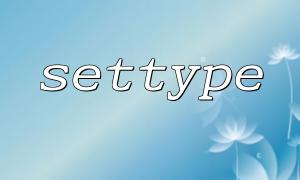In PHP, the settype() function is used to convert variables to specified data types. It not only changes the type of the variable, but also directly modifies the variable itself. This article will focus on the specific performance of settype() when converting variables to bool values and things to note.
The basic usage of settype() is as follows:
settype(mixed &$var, string $type): bool
$var is a variable of the type that needs to be converted, and the function will directly modify this variable.
$type is the target type, such as "bool" , "int" , "string" , etc.
The return value is a Boolean value indicating whether the conversion is successful.
When settype() converts a variable to a Boolean value, the conversion rules are consistent with PHP's built-in Boolean conversion rules:
"False" value is converted to false , including:
Boolean value false
Integer value 0
Floating point value 0.0
Empty string "" and string "0"
Empty array []
NULL
All other values are converted to true
Sample code:
$values = [0, 1, -1, "", "0", "hello", [], [1], null, false, true];
foreach ($values as $val) {
settype($val, "bool");
var_dump($val);
}
Output result:
bool(false)
bool(true)
bool(true)
bool(false)
bool(false)
bool(true)
bool(false)
bool(true)
bool(false)
bool(false)
bool(true)
settype() will directly modify the variable passed in. Note that if you want to retain the original value, you should copy the variable first.
$original = "0";
$copy = $original;
settype($copy, "bool");
var_dump($original); // string(1) "0"
var_dump($copy); // bool(false)
If the object or resource is passed in, the normal conversion of PHP is also followed when converting to a Boolean:
Resources and objects are generally converted to true unless they are null or empty objects.
Note that settype() cannot directly convert the object to a boolean, and the result may not be as expected.
Although settype() will succeed in most cases, some unsupported type conversions will return false .
$obj = new stdClass();
$result = settype($obj, "bool"); // return false,Unable to convert
var_dump($result);
| Features | illustrate |
|---|---|
| Directly modify the change amount | Settype() will change the variable itself passed in |
| Convert boolean values according to PHP rules | Only specific values (such as 0, empty string, NULL, etc.) will become false , and the others are true |
| Cannot convert complex objects | Cannot convert the object directly to a boolean, the conversion will fail and return false |
| Return to the successful conversion status | Returns a boolean value to indicate whether the conversion is successful |
Understanding these behaviors and limitations can help you more accurately control variable types and program logic when converting booleans using settype() .









